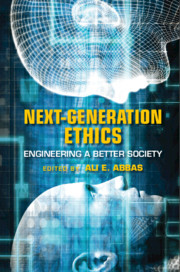Book contents
- Next-Generation Ethics
- Next-Generation Ethics
- Copyright page
- Contents
- Contributors
- Acknowledgment
- 1 Next-Generation Ethics
- 2 Ethical Distinctions for Building Your Ethical Code
- Part I Technology
- Part II Business Enterprises
- 9 Next-Generation Business Ethics: The Impact of Artificial Intelligence
- 10 Big Data Privacy, Ethics, and Enterprise Continuous Monitoring Systems
- 11 How Management Theories and Culture Fads Kill Organizational Ethics
- 12 How Next-Generation Teams and Teaming May Affect the Ethics of Working in Teams
- 13 Transparency: The What, Why, and How of Organizational Effectiveness and Ethics
- 14 Global Engagement by Leaders Is a Moral Imperative: Building the Next Generation of Ethical Corporate Cultures
- Part III Engineering
- Part IV Society
- Index
- References
9 - Next-Generation Business Ethics: The Impact of Artificial Intelligence
from Part II - Business Enterprises
Published online by Cambridge University Press: 18 October 2019
- Next-Generation Ethics
- Next-Generation Ethics
- Copyright page
- Contents
- Contributors
- Acknowledgment
- 1 Next-Generation Ethics
- 2 Ethical Distinctions for Building Your Ethical Code
- Part I Technology
- Part II Business Enterprises
- 9 Next-Generation Business Ethics: The Impact of Artificial Intelligence
- 10 Big Data Privacy, Ethics, and Enterprise Continuous Monitoring Systems
- 11 How Management Theories and Culture Fads Kill Organizational Ethics
- 12 How Next-Generation Teams and Teaming May Affect the Ethics of Working in Teams
- 13 Transparency: The What, Why, and How of Organizational Effectiveness and Ethics
- 14 Global Engagement by Leaders Is a Moral Imperative: Building the Next Generation of Ethical Corporate Cultures
- Part III Engineering
- Part IV Society
- Index
- References
Summary
The concerns and corporate practice of business ethics have evolved over the past sixty years. But none of the changes of the past are as great as those that will occur in the next ten years as artificial intelligence (AI) and machine learning become ubiquitous tools in American society. This chapter presents a concise history of corporate attention to business ethics over this historical period in order to identify how “next-generation business ethics” will demonstrate both continuity with and divergence from past attention to business ethics.
- Type
- Chapter
- Information
- Next-Generation EthicsEngineering a Better Society, pp. 115 - 128Publisher: Cambridge University PressPrint publication year: 2019

